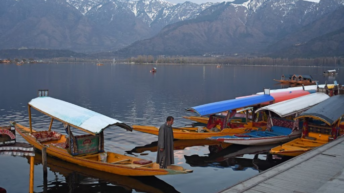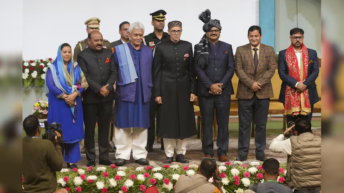|
Listen to article
Getting your Trinity Audio player ready...
|

A global pandemic, an economic collapse, and a tsunami of fear, uncertainty and hopelessness has exacerbated mental health crises across the globe. Suicide rates are alarmingly high with people struggling with anxiety, depression, and trauma like never before. This article addresses the need for more understanding and seeks for help for millions of Kashmiris, who are struggling with psychological distress. Acknowledging these distress, building and providing equitable access to mental health resources is the way forward for peace, security and well-being of the region.
The mental health of a country is only as good as the mental health of its least healthy people. The goal is to reach those who are being left behind, and bridge the gaps in broken systems. The health, social, justice and political systems are all connected and can’t be fixed till we invest in our people and communities. With this idea we visualize a holistic idea of peace, security and well-being in conflict affected Kashmir.
Decades of conflict and communal exodus of Kashmiri Pandits in Kashmir valley has imposed an enduring psychological distress on Kashmiri people. The current COVID-19 pandemic with lockdown measures to prevent the spread has further exacerbated the mental distress. Curfew, lockdown and social isolation increases feelings of loneliness, anxiety and depression.
According to a survey conducted in 2015 by Médecins Sans Frontières (MSF), India, University of Kashmir and the Institute of Mental Health and Neurosciences (IMHANS), 45% of Kashmir’s adult population (1.8 million) show symptoms of significant mental distress like depression (41%), anxiety (26%), post-traumatic stress disorder (19%), and 47% with some sort of traumatic experience which is compounded by the stigma associated with mental illness. The atmosphere of uncertainty and social insecurity for families amidst turmoil and violence makes females vulnerable, mentally disturbed and prone to suicide and drug-addiction. Schools in Kashmir are in a mental crisis, a study found that the prevalence of childhood (aged 8–14 years) mental disorders was 22–27%.
Alarmingly, 11% of adults in Kashmir have been taking benzodiazepines and hard drugs, including heroin and cocaine, which carry greater health and financial risks. The mental health epidemic is threat to health-socio-political security which is linked to drug abuse, drug addiction, suicide, unemployment and corruption.
The acceptance of conflicts and constant uncertainty has created an attitude of life without purpose and goals. Stressed out, aimless, rudderless youth often opt for extremes like suicide, or can be manipulated, recruited and exploited by extremist and militant organizations. The notable coping strategy in Kashmiri youth is turning to religion and religiosity, which explains the socio-religious correlating factor governing an individual’s relationship with stress. Mental disengagement strategies i.e. engaging in fun activities to take mind off from stressors, like visiting urban malls, cinema halls, sports complex, and internet connectivity are less popular. More research and studies to examine mental disengagement, stress management and coping strategies in conflict zones are needed to design effective, efficient and precise mental health intervention programmes.
Education is important and mental health is a prerequisite to academic success. To develop and nurture the whole child, our education system should develop a social-emotional curriculum with teachers trained for trauma-informed care. Early diagnosis and quality mental health care, programs that help students manage emotions, vent their feelings, build positive relationships, and make responsible decisions is much needed.
Infrastructure: with a population of around 13.6 million, Kashmir has less than 60 psychiatrists, who are affiliated and engaged in teaching at Government Medical College (GMC) and (Sher-I-Kashmir Institute of Medical Sciences) SKIMS hospital. The National Mental Health Plan and the District Mental Health Program was implemented in many districts of Kashmir to expand the system and services, but still a lot has to be done. Much of the psychiatric care is provided on a private consultation fee, which limits the access and affordability. There is a need for improving health systems and services for mental health care in Kashmir. We need to take mental health as brain health as it impacts the development of brain structures. And these brain structures design the structure of our nation.
Suggestions:
- Researchers, clinicians, and policymakers need to include and emphasize on vulnerable, traumatized populations while implementing national mental health policies and related interventions.
- Supporting mental health recipients with insurance coverage, extended treatment, stimulus package and welfare mechanism for education, employment opportunities as they are transitioning out of acute care. This will help to expand and facilitate services, break taboos and stigma and motivate others to seek help.
- Developing innovative teleconsulting and counseling apps and call centres, establishing well-equipped telepsychiatry service systems- it can help in boosting accessibility, affordability, timely diagnosis and improving the follow-up treatments and interventions.
- School mental awareness initiatives: engaging paediatrics psychologist, qualified counselor to develop social-emotional curriculum with teachers trained for trauma-informed care.
- Community radio station to educate and disengage with mental stress.
- Community well-being centre, for counseling with a full-time mental health officer, counselor, yoga therapist and social worker. These centres can design and improvise programs to cater the local mental health needs: A) Improving social wellness- positive relationships with family, community, nation and world. B) Emotional wellness- coping with trauma, acknowledging and sharing feelings, and transforming sadness, fear, anger, aggression and irritability into love, joy, happiness in a productive manner. C) Spiritual wellness- establishing peace and harmony, pitching a common purpose that binds people, nation and creation together. D) Physical wellness- healthy habits, avoiding destructive habits, activities and drug abuse to lead a positive life. E) Financial wellness- skill development and employment opportunity.
- Community capacity building- clinical psychologists and psychiatrists to train social leaders for grass root activities that hold potential to break the linkages between conflict and mental health. Constant positive engagements for physical and mental health, peace, local and social issues etc. Conflict induced fear and stress need to be transformed to dignity, honor, belonging and nationalism.
- Community Wellness fair- promoting holistic care, providing linkages to mental health support, training for community members, vaccine support, care and services for elderly people, sexual health and medical services, Kashmiri medicinal herbs, public yoga classes, gardening classes etc.
Clearing and countering militants and separatists responsible for death, destruction and trauma to Kashmiris is not enough. A positive peace, transformative strategy-to rehabilitate, diagnose and heal from trauma and bring mental, social, emotional, spiritual, physical and financial well-being is needed. Governments in New Delhi and Srinagar must prepare to prevent epidemics of psychological disorders. The idea of peace, security and well-being should be holistic, trans formative and inclusive, integrating innovative strategies for mental well-being. The National Mental Health policy framework must emphasize on rehabilitation and healing of traumatized and vulnerable populations of Kashmir like women, children, youth, Hindus and soldiers.
Aspiring nation ignites a spark of hope, makes its people safe and hopeful, and invests in their future. Talk, reach out, break stigma, build resources, ensure access- a hope on the horizon for lives struggling with mental health issues awaits.
Reference:
- Government of India. Policy Group DMHP; New Delhi: 2012. XIIth plan: district mental health plan.
- Housen, Tambri et al. “Prevalence of anxiety, depression and post-traumatic stress disorder in the Kashmir Valley.” BMJ global health vol. 2,4 e000419. 15 Oct. 2017, doi:10.1136/bmjgh-2017-000419.
- Housen T., Lenglet A., Shah S., Sha H., Ara S., Pintaldi G., Richardson A. Trauma in the Kashmir Valley and the mediating effect of stressors of daily life on symptoms of posttraumatic stress disorder, depression and anxiety. Conflict Health. 2019; 13:58.
- Shah, H., & Mishra, A. K. (2021). Trauma and children: Exploring post traumatic growth among school children impacted by armed conflict in Kashmir. American Journal of Orthopsychiatry, 91(1), 132–148. https://doi.org/10.1037/ort0000523.
- Paul MA, Khan W. Prevalence of Childhood Mental Disorders Among School Children of Kashmir Valley. Community Ment Health J. 2019 Aug;55(6):1031-1037. doi: 10.1007/s10597-018-0253-9. Epub 2018 Mar 5. PMID: 29508178.
- de Jong K., Ford N., van de Kam S. Conflict in the Indian Kashmir valley I: exposure to violence. Conflict Health. 2008; 2:10. Malla A., Margoob M., Iyer S. A model of mental health care involving trained lay health workers for treatment of major mental disorders among youth in a conflict-ridden, low-middle income environment: Part I Adaptation and implementation. Can J Psychiatr. 2019; 64:621–629.






डॉ जी यह बहुत अच्छा प्रयास है इस से दिमागी तौर पर ग्रस्त लोग ठीक होंगे ! जोकि मानवता का कल्याण करने बाला प्रयास सिद्ध हो गा लेकिन कश्मीर का माइंडसेट कैसे ठीक किया जाये इस के लिए बहुत ज़्यादा चिंतन की ज़रूरत है इस के माध्य्म से इन के लिए नेशनल करैक्टर बिल्डिंग के भी प्रयास करने पढ़ें गे नशा खोरी, सामाजिक बुराइओं से उन्हें मुक्त करना पड़े गा दुश्मन देशु के नापाक इरादूँ को विफल करने पड़े गा
आप के इन प्रयासों को में परनाम करता हूँ